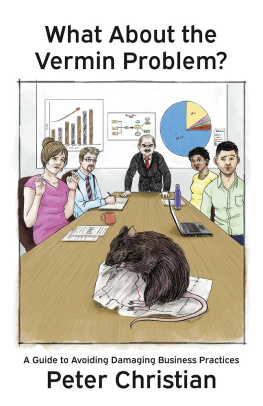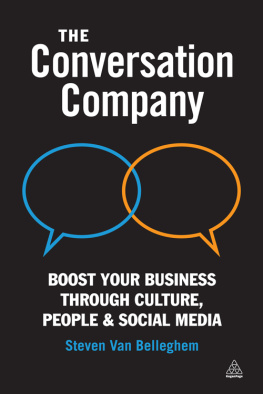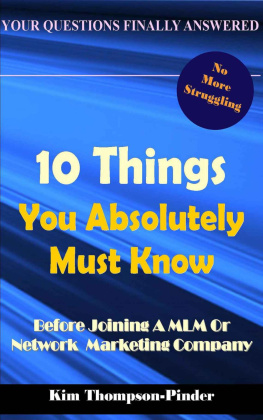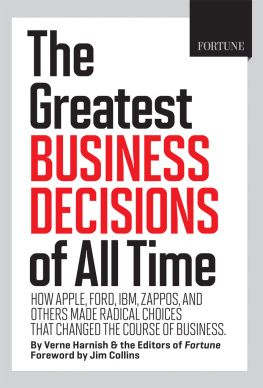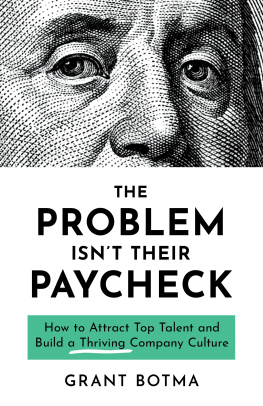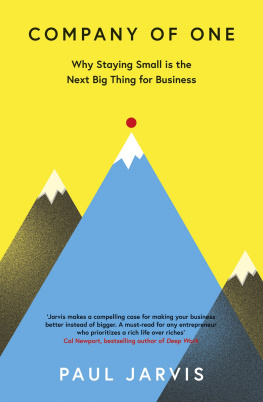I have worked closely with Peter Christian since 2005. He is adept at all levels of business and operations, from the board room to factory floor. These Dos and Donts, written anecdotally in plain English, will prove a valuable resource at all levels of any enterprise. I encourage companies to share this book with their teams and to review it together, section by section.
Joe Farkas,
Award-Winning Vistage Chair and Results Coach /Aspire Consulting, LLC
This book is insightful, open, humorous, and filled with interesting, easy-to-understand examples of what to do (or not to do) in leading your team to succeed. Learn from this expert who has seen dozens of leadership teams at work. You possibly will recognize some of the behaviors and want to emulate others!
Donna Burdzinski, Ed.D.
College Campus Provost
What About the Vermin Problem is a great read and it certainly rings true. Peter Christian walks the walk and hes taken many businesses to the next level with the insights hes so carefully laid out for the rest of us!
Jim Petrucci
Founder, J.G. Petrucci Co., Inc.
This book gives remarkable practical insight into how to properly and effectively run an organization. It is a great reminder that common-sense actions arent commonly used.
Rodney S. Ridley, Sr., Ph.D., RTTP
Associate Provost, Vice President, and Chief Operating Officer of the OPake Institute for Economic Development and Entrepreneurship Alvernia University
An easy read that provides firsthand examples of many experiences from Peters extensive career. Definitely worth the reading time!
Rich Hobbs, Manufacturing Executive
Manufacturers Resource Center
Having been a Business Advisor and Consultant, Pete is right on the money with many of his shared learnings and his comments about the business leaders you encounter. Many of them are good people and managers and the project results rewarding, but too often you can run into very bad and truly ugly, so the results are poor and unacceptable.
Joseph Winters
Business Owner, Renewal by Anderson
What About the Vermin Problem
Copyright 2019 by Peter Christian
All rights reserved. No part of this publication may be reproduced, distributed, or transmitted in any form or by any means, including photocopying, recording, or other electronic or mechanical methods, without the prior written permission of the publisher, except in the case of brief quotations embodied in critical reviews and certain other noncommercial uses permitted by copyright law. For permission requests, write to the publisher, addressed Attention: Permissions Coordinator, at the address below.
ISBN (Print): 978-1-54399-400-1
ISBN (eBook): 978-1-54399-401-8
Names and defining characteristics have sometimes been changed.
Printed by Bookbaby in the United States of America.
First printing edition 2020.
PHC Publications, LLC
8790 Mississippi Run
Weeki Wachee, FL 34613
www.petechristianbooks.com
This book is dedicated to the memory of William Clymer. Bill was one of the smartest, nicest, most honest and capable people I have ever known. He was a tremendous boss and I was proud to call him my friend.
Table of Contents
INTRODUCTION

Having spent more than 40 years as a novice, manager, director and later as president of a highly respected and successful business consulting firm, I have had an up-close view of how small, medium and very large corporations operate. Size is not the issue in how well they perform; rather success comes from an attitude and willingness to admit to issues and shortcomings, and a readiness to do what it takes in order to correct the problems and move ahead. If as much effort and energy was put into making things better than repeatedly correcting problems or situations, companies and organizations could be wildly successful.
The axiom Why is there never enough time to do things right the first time, but always enough to correct the problems is accurate, and I have observed and been involved in changing that paradigm on far too many occasions.
One would think that large companies or corporations, given their personnel and financial resources, would not be in such a situation. But, in many cases, they are the worst offenders. Unfortunately, obstacles such as inept managers who are functioning or not functioning stand in the way of progress. Their inability to lead, make important decisions, or persuade those higher on the organizational chart to do both, impedes progress. This frustrates those they are supposed to direct and causes them to be apathetic about the daily complications that arise. They accept This is the way it is, and either deal with it as best they can or, when the opportunity presents itself, bail out.
Executives who turn a blind eye to this reality confirm the saying, A fish rots from the head down. Knowing that your organization is underperforming, and not realizing it is being mismanaged, is a leadership sin. It is not wise if not impossible for a top executive to know every detail about what is going on in his or her business, especially when the enterprise is very large.
For example, one of my clients, a multibillion-dollar company, had a chief operating officer (COO) who reviewed and approved travel for every employee. What a waste of his time! And what a lack of trust in his managers to perform that task! An effective top executive hires good personnel to carry out the corporations vision. If something is askew, then changes are made and a more competent person is hired to fill the position.
As a manager, I reported to a director who was completely inept. He had been hired because at least a half dozen people who were offered the job turned it down for one reason or another. Though not really qualified, he was offered and accepted the job. Once in place, he proved he had no idea what he was doing and was in way over his head.
One day he and I had a meeting with the vice president to whom we reported. During the meeting the VPs secretary came in and asked him to take a call. He did and asked us to step outside for a moment. As soon as we did, the director told me we had to leave. He blamed me for taking too much of the VPs valuable time. The next morning, the VP called me and asked why we left. I told him what happened and he said it was his fault and we needed to finish the meeting we had cut short the day before.
Since it was early and the director never came in early, I said we would come up as soon as he came in. The VP said we didnt really need him and I should come up immediately because we could handle things ourselves. I did, and we did.
As time went on I dealt directly with the VP because it became apparent that he really had no use for the director. One day we discussed the situation and I asked why he kept the director on board. He told me you never should admit mistakes, but instead just bury them and move on. He relied on me and other managers in our department to do the right things and keep the director in check.
How many other companies and executives allow this head-in-the-sand practice? Too many, I am afraid.
Small companies have similar situations when they hire an unqualified manager to run the business. Because the company is small, they dont have staff to cover a persons mistakes, so they plod on. In some cases that person may be the owner. He or she may have started off great initially, but at some point the venture grew too big and complex for them and they now are in over their heads. Instead of realizing this predicament, they hold on and hope for some magic solution or that their bad luck will somehow change. What started as a terrific enterprise begins a downward spiral and eventually the company becomes a sad statistic. According to Bloomberg, eight of 10 entrepreneurs who start businesses fail within the first 18 months. A whopping 80% crash and burn.

